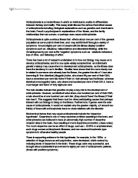Many psychologists have researched biological explanations of phobic behaviours. Kendler et al (1992) stated that whilst most specific phobias (fear of animals and objects) are probably a result of genetic factors, other fears such as agoraphobia (fear of open or public spaces) are probably due to genetic predisposition. This suggestion has been supported by studies such as those carried out on MZ and DZ twins by Torgersen (1983). Torgersen found that 31% of MZ twin participants shared a form of panic disorders, whereas DZ twins showed a 0% match. Solyom et al. (1974) carried out research into familial relations to phobic disorders. Solyom et al found that 45% of phobic participants reported a family history of phobic behaviours. DeSilva (1988) found that responses to phobic objects are universal, this does not mean that all phobic individuals acquired the fear in the same manner.
The law of contiguity states that events (stimuli) which occur immediately after a behaviour is shown, is likely to become paired and associated with that behaviour. This is seen in Pavlov’s (1927) study when his dogs associate the resonance of a bell with the arrival of food. Garcia et al (1966), stated otherwise. Garcia et al. showed that there are biological restrictions in an animal’s ability to acquire behaviours. This was shown when rats were given drinks that made them ill, thus causing an extinction of the drinking behaviour. Bolles at al (1980) stated that this conditioning may be different for some species and must account for evolutionary history.
Freud (1909) suggested reasons why humans develop phobias. Freud explains how traumas are developed through unresolved unconscious conflicts. These conflicts are displaced and transferred onto a neutral stimulus, thus leading way anxiety being associated with an object or situation. Freud used this theory to explain why ‘Little Hans’ had a fear of horses. Freud stated this phobia arose as a result of the unconscious fear of his father, due to the Oedipus complex and the element of castration.
Bennet-Levy and Marteau carried out a study of fear. Their study is the basis of the one used for this investigation. Bennet Levy and Marteau (1984) wanted to find out if there was a correlation between adjectives and the fear ratings of an animal. They carried out their investigation through the use of 2 questionnaires. Questionnaire 1 asked participants, in Group I, to rate their fear of an animal, questionnaire 2 asked participants, in Group II, to fill in their descriptions of animals. Bennet-Levy and Marteau found that there was a correlation between these 2 elements and high fear ratings would often correlate with high rating for adjectives.
The methodology and the aims for this investigation were derived from their study. This investigation aims is to find out if there is a relationship between the fear rating of an animal and the description given to it. Bennet-Levy and Marteau’s study aided the researcher to devise an alternate hypothesis that is testable. The alternate hypothesis is that there will be a strong, positive, statistically significant, correlation between the fear rating and the description of the animals. There will be a sex difference between fear ratings with females showing a higher fear rating. To test this the researcher has chosen to devise a questionnaire and then test the quantitative data using Spearman’s Rho for relationships and the Mann-Whitney U Test for sex difference. Through the use of these statistical tests the hypothesis may be attained or rejected.







